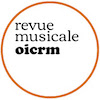 Appel de conférences pour la « Global Music History Study Group Session » du colloque annuel 2024 de l’AMS’ Chicago, 14-17 novembre 2024.
Appel de conférences pour la « Global Music History Study Group Session » du colloque annuel 2024 de l’AMS’ Chicago, 14-17 novembre 2024.
« As the AMS annual 2024 conference takes place in Chicago, the Global Music History Study Group aims to organize a place-based study group session inspired by a global city such as Chicago or a region such as the Midwest in the U.S. The study group invites short presentations of 7–10 minutes on the globalities and other worldings sounded in geographic centers (whether a region or a city) located away—although not necessarily disconnected—from coastal areas and port cities. This session examines how geographic centers and “mid-locations” (regionally, nationally, continentally) take on the role of a logistical center, interconnecting towns and cities in the region, and providing the material conditions for encounters among travelers, migrants, locals, and Indigenous peoples. Because port cities have developed through ready access to oceans, acting typically as regional end-points of domestic shipping networks, many global studies have focused on port cities as global cities. However, the development of geographic centers away from the coast indicates other historical integration processes that have also had a global impact.
Sounding a Center away from the Coast: Music, Exchange, Intersection
The Global Music History study group session aims to examine the ways music contributes to and shapes these geographic centers. Questions include, but are not limited to, the following: Which logistical, infrastructural, and environmental factors and processes have made a place away from the coast such as Chicago a global city? How does music serve as a marker of the in-between in these locales, making space for dialogue and exchanges for the communities who live, travel, or stay there? How have musicians and various actors in music, including agents, critics, scholars, impresarios, conductors, educators, DJs, and composers, shaped the globality of these centers? How do genres originated or flourished in these geographic centers interrelate with other genres? How do the historically marginalized groups find or create new opportunities through music in these in-between locations? What are the large-scale processes, musical or otherwise, playing out in and through these locations that decenter other comparable centers in the region or the nation? What kinds of globalities and mobilities have been produced in landlocked regions that have lost sovereign access to coastal frontage? Please send a title; a 250-word abstract; and institutional affiliation or City/State to hedy.law-at-ubc.ca or dfcastropan-at-uncg.edu by March 5, 2024. »
Pour plus de détails : cliquez ici.
